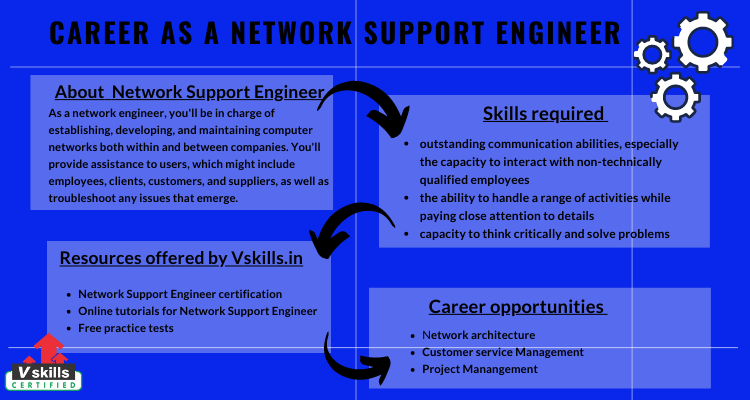Network Support Engineer are IT specialists who guarantee that a company’s network runs smoothly and safely. They may be part of an in-house support team or a third-party support team.
Let us discover Career as a Network Support Engineer!
About Network Support Engineer
As a network engineer, you’ll be in charge of establishing, developing, and maintaining computer networks both within and between companies. You’ll provide assistance to users, which might include employees, clients, customers, and suppliers, as well as troubleshoot any issues that emerge.
In certain situations, this may entail the creation of new networks. Your goal is to maintain the integrity of your high-availability network architecture so that your users may get the best possible performance. You might work either internally as part of an organization’s IT support staff or externally as part of a multi-client outsourced IT networking consultant business.
Roles and Responsibilities
A Basic Network Professional play a key role in maintaining the systems that allow organisations to function and communicate, both internally and externally, on a daily basis. Regardless of the domain they work in they’ll be responsible for the following:
- To begin with, Installing new hardware and Installing new software
- Then, Setting up user accounts, permissions and passwords
- Also, Overseeing security of all systems, especially the internet, and installing antivirus protection
- Moreover, Fixing network faults and Network maintenance
- Further, Technical support for people using the network
- Additionally, Training staff on new systems
- Day to day admin and monitoring of network use
- Likewise, planning future improvements, suggesting IT solutions to business problems
- Finally, supervising helpdesk staff If you choose to work for a large company, it’s likely you’ll have a designated area of the network to work on; if you work for a smaller company you’ll probably be in charge of the entire network.
Educational Qualification
To work as a network engineer, you must have at least a bachelor’s degree in engineering. You must also have a thorough grasp of all elements of a network, including network systems, design, and maintenance; network protocols; and bandwidth creation, deployment, and support, to name a few. Candidates for high-end jobs may be required to obtain a master’s degree in their field of specialty. The larger the business, the more exclusive and rigorous its standards may be.
Those without these credentials, however, might still find work by enrolling in one of the short-term courses provided by numerous private computer training centres. Private institutes often provide short-term hardware and networking courses ranging from three months to a year. In India, there are a number of private computer training institutions that provide hardware instruction. It is not necessary to have a minimum educational qualification to work in this profession. An intermediate level of education, on the other hand, is typically desired.
Career prospects
Your career path will be influenced by the size of the company you work for and the breadth of its IT systems to some extent. After gaining experience, you can advance to roles such as senior network manager and network management. Some network engineers opt to branch out into other areas of IT, customer service, or management. Project management for technical or infrastructural projects, as well as network architecture, are options.
Those who begin as help-desk technicians may advance to network engineer positions, then senior network support positions, and eventually network controller positions (mainly involved in decision-making, staff management and advice on future strategy). In an organisation such as a large bank or a significant government agency, this may be the standard path.
If you work for a small business, you could be the network controller right away, in addition to having a variety of other IT and technical support tasks. If programming is something you like and want to stay up with, you should be aware of this before committing yourself to a network engineering or network support position. There are chances to go into IT contracting and self-employment with expertise.
Skills required
You’ll need the following skills in order to become good at your work –
- a current grasp of your employer’s business and industry needs, as well as the technical requirements
- to see the value of a customer-centric approach and/or meeting the demands of the end user
- outstanding communication abilities, especially the capacity to interact with non-technically qualified employees
- the ability to handle a range of activities while paying close attention to details
- capacity to think critically and solve problems
- Teamwork abilities and the capacity to feel at ease working with a variety of teams, clients, and groups of employees within an organisation are essential.
- You should have good organisational abilities and be able to prioritise your workload.
Market Demand and Average Salary
Network engineers can work for big businesses and worldwide commercial enterprises after gaining a specific level of expertise. A network engineer usually has a specialty, such as design, performance management, or reporting. In the IT sector, and therefore in the field of network engineering, there is plenty of room for advancement and possibilities. The demand for network engineers to build, maintain, and optimise network systems is expected to stay steady, if not rise, as the globe advances toward increased interconnectivity.
One of the highest-paying job descriptions in the IT sector is network engineering. Education and experience, like with other technical disciplines, play a role in determining the pay that a network engineer is qualified for. According to PayScale, depending on your educational credentials and job experience, you may earn anywhere from Rs. 1.2 lakh to Rs. 6 lakh each year. Higher wages, as well as bonuses, increments, and incentives, may be offered by larger firms. Individual performance and talents are frequently a factor in such increased compensation.
Resources for Career as Network Support Engineer
Before you can become an expert in desired areas, you must first build a solid base. Before you can move on to practical teaching, you’ll need to have the right applied skills. To gain a full understanding of the domain, you can use the following tools:
- Firstly, Online Tutorials for Network Support Engineer
- Professional certification courses for brushing up skills as Network Support Engineer
- Also, Certification Courses from verified sources such as Vskills, Coursera, Udemy and so on.
- In addition, Online communities
- Moreover, Blogs and study material from experts in this field and many more.
Here are some examples of how you can improve your abilities:
- Freelancing
- Internships
- Apprenticeship programs
The above steps will help you to get this domain started. It’s a long way to go, however. You can take an advanced course to reach a new level of skills.
Some resources offered by Vskills
Vskills offer Network Support professional certification for all those interested in working in this field. This certification course covers the following topics –
- WAN Configuration
- WAN Concepts
- Troubleshooting IP Routing
- Routing Protocol Concepts and Configuration
- Operating Routers
- Wireless LANs
- Switch Troubleshooting
- Ethernet Switch Configuration
- LAN Switches
- LAN Switching
- Network Security
- Applications
- TCP/IP Transport Layer
- Internet Protocol
- WAN
- Networking Models
- Introduction to Networking Concepts
- LAN
Vskills also offers free practice tests and online tutorials to supplement the learning process. You can check them by clicking on the following links –
Discover the career opportunities and other prospects of Career as a Network Support Engineer. Hurry up and start preparing now with Vskills.in!




